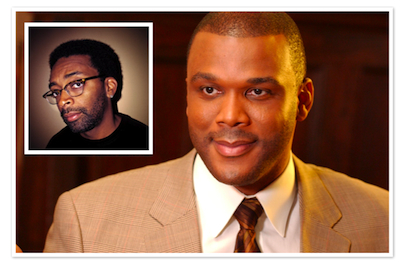Tyler Perry to Spike Lee: “I would love to read that to my fan base.”

Once upon a time (i.e. this past spring), Spike Lee Called Out Tyler Perry:
“Each artist should be allowed to pursue their artistic endeavors but I still think there is a lot of stuff out today that is “coonery” and buffoonery. I know it’s making a lot of money and breaking records, but we can do better. … I am a huge basketball fan, and when I watch the games on TNT, I see these two ads for these two shows (Tyler Perry’s “Meet the Browns” and “House of Payne”) and I am scratching my head. … We got a Black president and we going back to Mantan Moreland and Sleep ‘n’ Eat?”
Spike goes on to say:
“We’ve had this discussion back and forth. When John Singleton [made “Boyz in the Hood”], people came out to see it. But when he did “Rosewood,” nobody showed up. So a lot of this is on us! You vote with your pocketbook, your wallet. You vote with your time sitting in front of the idiot box, and [Tyler Perry] has a huge audience. We shouldn’t think that Tyler Perry is going to make the same film that I am going to make, or that John Singleton or my cousin Malcolm Lee [would make]. As African Americans, we’re not one monolithic group so there is room for all of that. But at the same time, for me, the imaging is troubling and it harkens back to “Amos n’ Andy.””
TP responded to Lee on “60 Minutes” by saying:
“You know, that pisses me off. It really does. Because it’s so insulting. It’s attitudes like that that make Hollywood think that these people do not exist and that’s why there’s no material speaking to them. I would love to read that to my fan base. [The characters are] disarming, charming, make-you-laugh bait so I can slap Madea in something and talk about God, love, faith, forgiveness, family, any of those things.”
Sadly, this is just one more internal debate amongst African Americans being hashed out on a national platform and it’s almost impossible not to take sides given our history in this country. Alas, what’s done is done, and the battle wages on.
Spike’s commitment to uplifting the Black community throughout his accomplished career is unquestionable. Upon reflecting on his catalogue of work, it’s also pretty evident that he’s a proponent for progress in general as he strives to present stories that deal with a myriad of themes from coming-of-age (Crooklyn) and homosexuality (She Hate Me). Within each film, he manages to capture the intricacies of every day life, but always with the African American audience in mind.
Nevertheless, it’s clear that Tyler aims to uplift our community as well, covering subject matters that affect many Black Americans with humor and hope. We’ve all witnessed the evolution of his Spike Lee’s film career over the past 2 decades. Perhaps in another 15 years or so, Perry’s body of work will show that he is, in fact, not in the business of ‘holding us back.’ Some of his recent films have been absent of the alleged “coonery” of which Lee speaks. “Why Did I Get Married” is a prime example free of minstrel-like imagery.
Many are inclined to focus on the debate between these two dynamic gentlemen, but a large portion of the contention belongs to the big film studios. If they didn’t back and distribute Perry’s films (or any films accused of perpetuating stereotypes) this debate would not exist.
Sure, many cringe when they see Madea pull a gun out from under her dress or the eye popping of that fellow from “Meet the Blacks/Browns,” but many of us find that stuff pretty hilarious too. Is it possible that both Perry and Lee only differ in the manner in which they present similar ideals or is this a case of “progress vs. regress”? To echo Lee’s initial statement, every artist should be allowed to pursue their artistic endeavors. But like the saying goes, “with great power, comes great responsibility.”
So what do you think? – Buffonery, or not buffonery: that is the question.
Written By: Sky Obercam – Clutch Magazine




